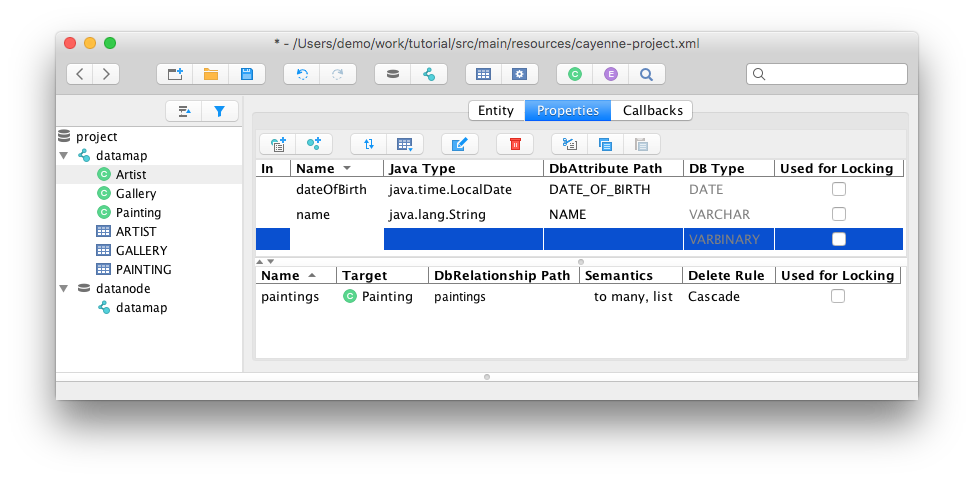Apache Cayenne alternatives and similar libraries
Based on the "ORM" category.
Alternatively, view Apache Cayenne alternatives based on common mentions on social networks and blogs.
-
OrmLite
Core ORMLite functionality that provides a lite Java ORM in conjunction with ormlite-jdbc or ormlite-android
WorkOS - The modern identity platform for B2B SaaS

* Code Quality Rankings and insights are calculated and provided by Lumnify.
They vary from L1 to L5 with "L5" being the highest.
Do you think we are missing an alternative of Apache Cayenne or a related project?
README
<!-- Licensed to the Apache Software Foundation (ASF) under one or more contributor license agreements. See the NOTICE file distributed with this work for additional information regarding copyright ownership. The ASF licenses this file to you under the Apache License, Version 2.0 (the "License"); you may not use this file except in compliance with the License. You may obtain a copy of the License at
https://www.apache.org/licenses/LICENSE-2.0
Unless required by applicable law or agreed to in writing,
software distributed under the License is distributed on an
"AS IS" BASIS, WITHOUT WARRANTIES OR CONDITIONS OF ANY
KIND, either express or implied. See the License for the
specific language governing permissions and limitations
under the License.
-->
Apache Cayenne
<!-- Broken maven badge: -->
<!-- Jenkins badge:
-->
Apache Cayenne is an open source persistence framework licensed under the Apache License, providing object-relational mapping (ORM) and remoting services.
Table Of Contents
Quick Start
Create XML mapping
Modeler GUI application
You can use Cayenne Modeler to manually create Cayenne project without DB. Binary distributions can be downloaded from https://cayenne.apache.org/download/
See tutorial https://cayenne.apache.org/docs/4.1/getting-started-guide/
Maven plugin
Additionally you can use Cayenne Maven (or Gradle) plugin to create model based on existing DB structure. Here is example of Cayenne Maven plugin setup that will do it:
<plugin>
<groupId>org.apache.cayenne.plugins</groupId>
<artifactId>cayenne-maven-plugin</artifactId>
<version>4.1</version>
<dependencies>
<dependency>
<groupId>mysql</groupId>
<artifactId>mysql-connector-java</artifactId>
<version>8.0.13</version>
</dependency>
</dependencies>
<configuration>
<map>${project.basedir}/src/main/resources/demo.map.xml</map>
<cayenneProject>${project.basedir}/src/main/resources/cayenne-demo.xml</cayenneProject>
<dataSource>
<url>jdbc:mysql://localhost:3306/cayenne_demo</url>
<driver>com.mysql.cj.jdbc.Driver</driver>
<username>user</username>
<password>password</password>
</dataSource>
<dbImport>
<defaultPackage>org.apache.cayenne.demo.model</defaultPackage>
</dbImport>
</configuration>
</plugin>
Run it:
mvn cayenne:cdbimport
mvn cayenne:cgen
See tutorial https://cayenne.apache.org/docs/4.1/getting-started-db-first/
Gradle plugin
And here is example of Cayenne Gradle plugin setup:
buildscript {
repositories {
mavenCentral()
}
dependencies {
classpath group: 'org.apache.cayenne.plugins', name: 'cayenne-gradle-plugin', version: '4.1'
classpath 'mysql:mysql-connector-java:8.0.13'
}
}
apply plugin: 'org.apache.cayenne'
cayenne.defaultDataMap 'demo.map.xml'
cdbimport {
cayenneProject 'cayenne-demo.xml'
dataSource {
driver 'com.mysql.cj.jdbc.Driver'
url 'jdbc:mysql://127.0.0.1:3306/cayenne_demo'
username 'user'
password 'password'
}
dbImport {
defaultPackage = 'org.apache.cayenne.demo.model'
}
}
cgen.dependsOn cdbimport
compileJava.dependsOn cgen
Run it:
gradlew build
Include Cayenne into project
Maven
<dependencies>
<dependency>
<groupId>org.apache.cayenne</groupId>
<artifactId>cayenne-server</artifactId>
<version>4.1</version>
</dependency>
</dependencies>
Gradle
compile group: 'org.apache.cayenne', name: 'cayenne-server', version: '4.1'
// or, if Gradle plugin is used
compile cayenne.dependency('server')
Create Cayenne Runtime
ServerRuntime cayenneRuntime = ServerRuntime.builder()
.addConfig("cayenne-demo.xml")
.dataSource(DataSourceBuilder
.url("jdbc:mysql://localhost:3306/cayenne_demo")
.driver("com.mysql.cj.jdbc.Driver")
.userName("username")
.password("password")
.build())
.build();
Create New Objects
ObjectContext context = cayenneRuntime.newContext();
Artist picasso = context.newObject(Artist.class);
picasso.setName("Pablo Picasso");
picasso.setDateOfBirth(LocalDate.of(1881, 10, 25));
Gallery metropolitan = context.newObject(Gallery.class);
metropolitan.setName("Metropolitan Museum of Art");
Painting girl = context.newObject(Painting.class);
girl.setName("Girl Reading at a Table");
Painting stein = context.newObject(Painting.class);
stein.setName("Gertrude Stein");
picasso.addToPaintings(girl);
picasso.addToPaintings(stein);
girl.setGallery(metropolitan);
stein.setGallery(metropolitan);
context.commitChanges();
Queries
Select Objects
List<Painting> paintings = ObjectSelect.query(Painting.class)
.where(Painting.ARTIST.dot(Artist.DATE_OF_BIRTH).lt(LocalDate.of(1900, 1, 1)))
.prefetch(Painting.ARTIST.joint())
.select(context);
Aggregate functions
// this is artificial property signaling that we want to get full object
Property<Artist> artistProperty = Property.createSelf(Artist.class);
List<Object[]> artistAndPaintingCount = ObjectSelect.columnQuery(Artist.class, artistProperty, Artist.PAINTING_ARRAY.count())
.where(Artist.ARTIST_NAME.like("a%"))
.having(Artist.PAINTING_ARRAY.count().lt(5L))
.orderBy(Artist.PAINTING_ARRAY.count().desc(), Artist.ARTIST_NAME.asc())
.select(context);
for(Object[] next : artistAndPaintingCount) {
Artist artist = (Artist)next[0];
long paintingsCount = (Long)next[1];
System.out.println(artist.getArtistName() + " has " + paintingsCount + " painting(s)");
}
Raw SQL queries
// Selecting objects
List<Painting> paintings = SQLSelect
.query(Painting.class, "SELECT * FROM PAINTING WHERE PAINTING_TITLE LIKE #bind($title)")
.params("title", "painting%")
.upperColumnNames()
.localCache()
.limit(100)
.select(context);
// Selecting scalar values
List<String> paintingNames = SQLSelect
.scalarQuery(String.class, "SELECT PAINTING_TITLE FROM PAINTING WHERE ESTIMATED_PRICE > #bind($price)")
.params("price", 100000)
.select(context);
// Insert values
int inserted = SQLExec
.query("INSERT INTO ARTIST (ARTIST_ID, ARTIST_NAME) VALUES (#bind($id), #bind($name))")
.paramsArray(55, "Picasso")
.update(context);
Documentation
Getting Started
https://cayenne.apache.org/docs/4.1/getting-started-guide/
Getting Started Db-First
https://cayenne.apache.org/docs/4.1/getting-started-db-first/
Full documentation
https://cayenne.apache.org/docs/4.1/cayenne-guide/
JavaDoc
https://cayenne.apache.org/docs/4.1/api/
About
With a wealth of unique and powerful features, Cayenne can address a wide range of persistence needs. Cayenne seamlessly binds one or more database schemas directly to Java objects, managing atomic commit and rollbacks, SQL generation, joins, sequences, and more. With Cayenne's Remote Object Persistence, those Java objects can even be persisted out to clients via Web Services.
Cayenne is designed to be easy to use, without sacrificing flexibility or design. To that end, Cayenne supports database reverse engineering and generation, as well as a Velocity-based class generation engine. All of these functions can be controlled directly through the CayenneModeler, a fully functional GUI tool. No cryptic XML or annotation based configuration is required! An entire database schema can be mapped directly to Java objects within minutes, all from the comfort of the GUI-based CayenneModeler.
Cayenne supports numerous other features, including caching, a complete object query syntax, relationship pre-fetching, on-demand object and relationship faulting, object inheritance, database auto-detection, and generic persisted objects. Most importantly, Cayenne can scale up or down to virtually any project size. With a mature, 100% open source framework, an energetic user community, and a track record of solid performance in high-volume environments, Cayenne is an exceptional choice for persistence services.
Collaboration
License
Cayenne is available as free and open source under the Apache License, Version 2.0.
*Note that all licence references and agreements mentioned in the Apache Cayenne README section above
are relevant to that project's source code only.



